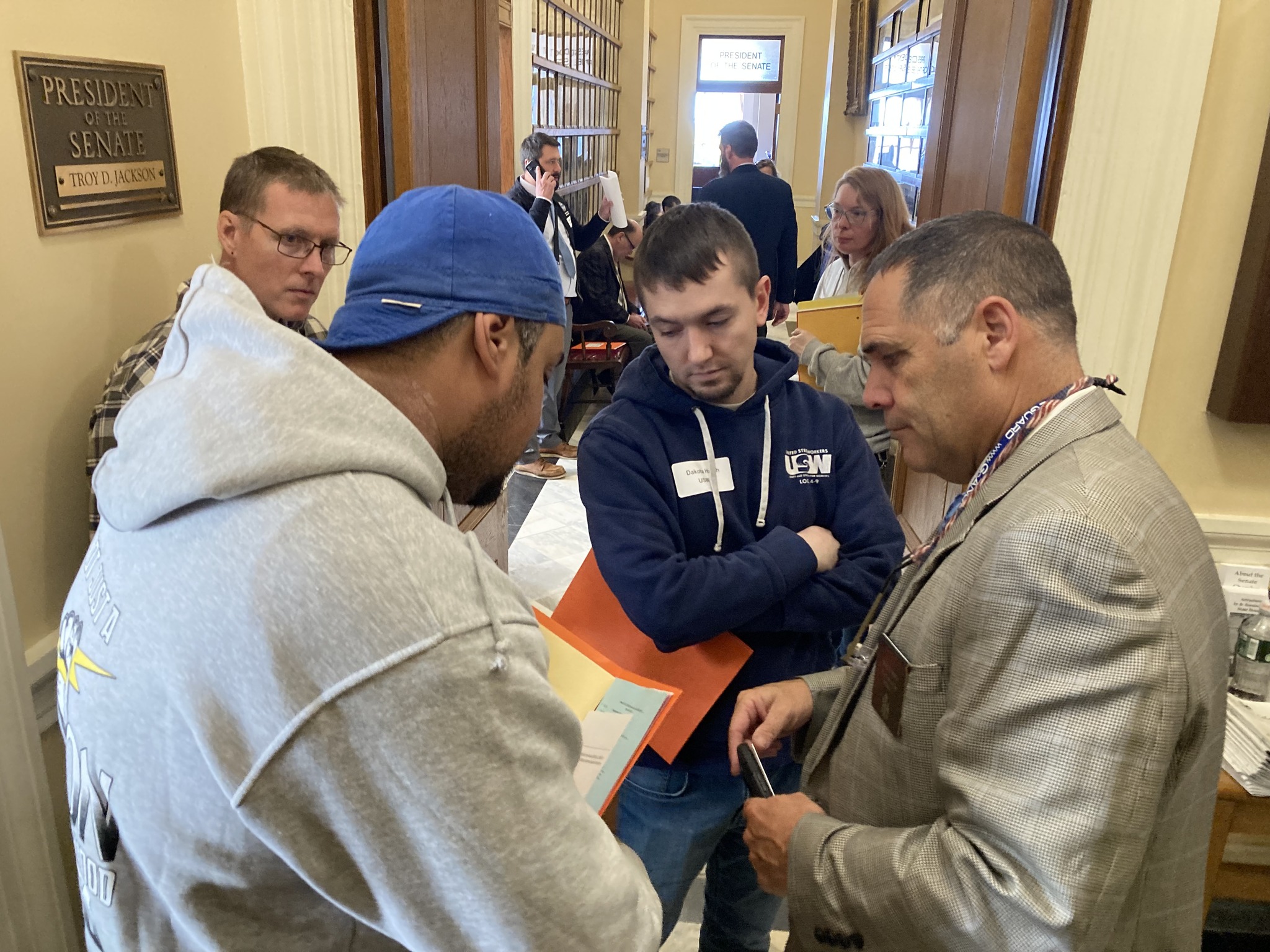200 Workers Gather for Labor Lobby Day in Augusta; Roll out Working Families 2023 Legislative Priorities

Nearly 200 workers gathered at the Statehouse in Augusta on Thursday to talk with legislators about key worker issues as part of the Maine AFL-CIO’s annual Labor Lobby Day. The group — which included members of the Maine’s AFL-CIO’s 200 union affiliates — released their 2023 Working Families Legislative Agenda on Tuesday at a press conference in the Hall of Flags. You can view the livestream of the press conference on our Facebook page.
“Our last in-person Labor Lobby Day was on March 12, 2020 — the same day that the first case of COVID-19 was reported in Maine. Since then over 100 million people came down with COVID and 1.1 million have died of the illness in the US. During the pandemic, workers made tremendous sacrifices and many died on the frontlines,” said Cynthia Phinney, President of the Maine AFL-CIO. “Working people deserve to freely engage in collective bargaining without fear of retaliation; to rest and spend time with their families; to have safe working conditions and to earn good wages with quality health care and retirement security. We are here today because we need our legislators to stand up for an economy that works for everyone, not just those at the top.”

Union members also met with Governor Janet Mills, Senate leaders Troy Jackson, Mattie Daughtry and Eloise Vitelli, Speaker Talbot-Ross and other legislative leaders.
Union members stood in solidarity with overworked paper mill workers, who are increasingly being forced to work longer hours of mandatory overtime with multiple shifts in a row. LR 756, sponsored by Senate President Troy Jackson, would limit employers from imposing mandatory overtime on mill workers while preserving their right to voluntary overtime.
“Over the last five years, my employer has continually denied me time off whenever 'operating conditions' dictate,” said Eric McLean, a member USW 900 who works at the Nine Dragons paper mill in Rumford. “I and other operators in my department have been working 60 hours a week to cover being short staffed, with no regard to the negative effects on our personal lives. They have also revised vacation and attendance policies, to make it impossible to say no to overtime. Forcing people to work such grueling schedules is not only inhumane, but it is also dangerous, both for workers and the public.”

McLean pointed to the tragic story of the Maine corrections officer who fell asleep at the wheel and killed a 9-year-old girl after working consecutive 16-hour shifts.
“This heartbreaking story should serve as a cautionary tale for our lawmakers of the dangers of excessive overtime,” he added.
From Starbucks and Amazon to Maine Medical Center, Shalom House and the University of Maine, workers across Maine and the nation are organizing unions to have a say in the decisions that affect them in the workplace. However, too often employers force workers to attend anti-union meetings during work hours where they cajole, coerce, scare, intimidate and even threaten workers to prevent them from exercising their First Amendment rights.

LR 1105, sponsored by Sen. Mattie Daughtry (D-Brunswick), would strengthen our Constitutional right to Freedom of Association by prohibiting employers from forcing employees to attend anti-union captive audience meetings.
"During the time I was organizing my fellow employees and I were required to attend weekly staff meetings. At the end of each meeting management would share their opinions about union organizing and spread misinformation about unions," said Michaela Flint, a former Portland Museum of Art employee who helped organize the UAW Local 2110 unit there. " Portland Museum of Art used fear and lies to mislead their workforce against their constitutional right to organize."

Members of the Maine State Nurses Association attended Labor Lobby Day to support LR 765, sponsored by Senator (and RN) Stacy Brenner (D-Scarborough), which would protect patients and improve health care by setting minimum, registered nurse-to-patient staffing ratios.
“Delayed and missed care due to poor staffing ratios can lead to devastating consequences. We have patients that are encephalopathic, have dementia, traumatic brain injuries and are very, very high fall risks,” said Sadie Tirrell, a registered nurse at Maine Medical Center and member of the Maine State Nurses Association. “If there is no one sitting physically with these patients, it’s not a matter of if they will fall but how bad it will be and how many times it is going to happen before management affords us another staff member.”

As the state struggles to hire enough qualified employees, the Maine AFL-CIO is calling on the Legislature to fund the state’s reclassification and compensation study and provide funding to substantially close the state employee pay gap to retain a qualified workforce. LR 1090, sponsored by Rep. Drew Gattine (D-Westbrook), will ensure that the state completes and implements the ongoing review of the State’s compensation and classification system.
“We’re here today because for decades, the state of Maine has been underpaying the thousands of state workers who have dedicated their lives to serving Maine people. State workers are finding it increasingly difficult to maintain the high level of services we pride ourselves in delivering. This is due to widespread understaffing, high turnover and the difficulty the State has been experiencing in recruiting and retaining workers,” said Dean Staffieri, President of the Maine Service Employees Association. “The state must end the state employee pay gap and start paying state workers comparable to their peers. It’s the right thing to do — and it’s also necessary for the State to recruit and retain qualified workers.”
With retired public employees struggling to make ends meet with the high cost of living, union members are also asking the Legislature and the Mills administration to support LD 70, sponsored by Rep. Jan Dodge (D-Belfast), would eliminate the cap on retirement benefits for state employees and teachers to which a cost-of-living adjustment is made. Staffieri also urged support for LD 111 and 591, which would improve retiree health care for teachers and other public employees.

Finally, the Maine Building and Construction Trades Council urged support for LR 1579, sponsored by Rep. Traci Gere (D-Kennebunkport), which would put stronger standards and incentives for Registered Apprenticeships in the construction industry so that apprentices are diverse, receive industry-appropriate training, and are fairly compensated upon graduation.
"While our Registered Apprenticeship programs lead straight to middle class careers with good wages and fulsome benefits for the diverse entirety of Maine’s working families, we’re also seeing more and more of the ‘good enough is good enough’ approach from others," said Jason J. Shedlock, President of the Maine State Building & Construction Trades Council and Vice President/Secretary Treasurer for Local 327 of the Laborers’ International Union.. Shedlock, who is also a Regional Organizer for the New England Laborers', "So it’s time to pick the bar up off the ground and raise it to a level that ensures the skill and safety that’s called for in today’s construction industry, recalibrates compensation and benefits that reflect that professionalism; and retires the oft-performative ‘we tried’ approach towards diversity in the industry."
To see more photos of Labor Lobby Day press conference visit our Facebook page!
